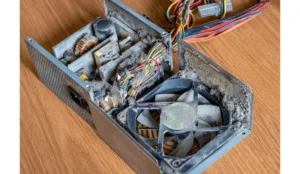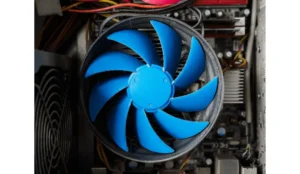
Computer fan noise is a common problem that can be caused by a number of factors, such as dust buildup, a faulty fan, or a malfunctioning hard drive. In some cases, computer fan noise can also be a sign of a more serious problem, such as overheating. If you are experiencing computer fan noise, it is important to identify the cause of the problem so that you can take steps to fix it.
Laptops are known for their portability and convenience, but they can also be quite noisy. If your laptop sounds like a jet engine, there are a few possible reasons why.
1. Dust buildup
One of the most common causes of a loud laptop is dust buildup. Dust can clog the vents on your laptop, preventing airflow and causing the fans to work harder. This can lead to a loud buzzing or whirring noise.
To fix this problem, you can try to clean the dust out of your laptop’s vents. You can use a can of compressed air or a vacuum cleaner with a soft brush attachment. Be sure to turn off your laptop and unplug it before you start cleaning.
2. Overheating
Another common cause of a loud laptop is overheating. If your laptop is running too hot, the fans will have to work harder to cool it down. This can lead to loud noise.
There are a few things you can do to prevent your laptop from overheating. First, make sure that you are not running too many programs at once. Second, keep your laptop in a well-ventilated area. Third, you may want to consider investing in a laptop cooling pad.
If your laptop is overheating, you can try the following things to cool it down:
- Close any unnecessary programs or applications.
- Move your laptop to a cooler location.
- Use a laptop cooling pad.
- Clean out the dust buildup as described above.
3. Worn-out fans
Over time, the fans in your laptop may wear out. This can cause them to make a loud noise or even stop working altogether.
If you think that your laptop’s fans may be worn out, you should take it to a qualified technician to have them replaced.
Other possible causes
In addition to dust buildup, overheating, and worn-out fans, there are a few other possible causes of a loud laptop. These include:
- A faulty power supply
- A failing hard drive
- A virus or other malware infection
If you have tried all the above solutions and your laptop is still making a loud noise, you may need to take it to a qualified technician to diagnose the problem.
Why is your computer fan making a high-pitched noise?
- Dirty cooling fan. One of the most common reasons for a high-pitched noise from your computer fan is dirt and dust buildup on the fan blades. This can cause the fan to work harder to circulate air, which can lead to a high-pitched noise.
- Loose or damaged fan. Another possible reason for a high-pitched noise from your computer fan is a loose or damaged fan. This can cause the fan to wobble or vibrate, which can lead to a high-pitched noise.
- Bad bearing. The bearings in your computer fan can also wear out over time, which can cause a high-pitched noise.
- Software issue. In rare cases, a software issue can also cause your computer fan to make a high-pitched noise.
How to fix a high-pitched noise from your computer fan

- Clean the fan blades. If the fan blades are dirty, you can try cleaning them with a can of compressed air. Be sure to hold the can upright and direct the air away from the fan motor.
- Replace the fan. If the fan is loose or damaged, you may need to replace it. You can usually find replacement fans at most electronics stores.
- Lubricate the bearings. If the bearings in the fan are worn out, you can try lubricating them with a small amount of oil. Be sure to use a light oil, such as sewing machine oil or WD-40.
- Update your software. If you suspect that a software issue is causing the high-pitched noise, you can try updating your computer’s software.
Tips for preventing a high-pitched noise from your computer fan
- Keep your computer clean. Dust and dirt buildup can cause the fan to work harder and make a high-pitched noise.
- Avoid overloading your computer. If you run too many programs at once, your computer’s fan may have to work harder to keep up, which can lead to a high-pitched noise.
- Keep your computer cool. If your computer is overheating, the fan may have to work harder to cool it down, which can lead to a high-pitched noise. You can help keep your computer cool by keeping it in a well-ventilated area and avoiding placing it in direct sunlight.
If you are still having problems with a high-pitched noise from your computer fan, you may need to contact a computer technician for help.
Why is My Computer Fan So Loud?
Clogged or Blocked Air Vents
-
- Similar to the reason above, clogged or blocked air vents inhibit proper airflow causing the internal components to get overheated and putting more pressure on the fan.
- When the fan works overtime trying to cool your PC, it creates loud, annoying noise.
- To fix this, you can try to clean the air vents with compressed air or a vacuum cleaner.
- If the air vents are still blocked after cleaning, you may need to replace them.
Other Possible Reasons
- Dirty Fans
- Dust and dirt can build up on the fan blades over time, making them less efficient and causing them to work harder.
- This can lead to loud fan noise.
- To fix this, you can clean the fans with compressed air or a vacuum cleaner.
- Overheating Components
- If your computer’s components are overheating, the fan will need to work harder to cool them down.
- This can lead to loud fan noise.
- To fix this, you can try to identify the component that is overheating and take steps to cool it down.
- This may involve adjusting the fan settings, cleaning the components, or upgrading your cooling system.
- Faulty Fan
- If the fan itself is faulty, it may be making loud noise even when it is not working hard.
- In this case, you will need to replace the fan.
How to Fix a Loud Computer Fan

- Clean the fans. This is the most common and easiest way to fix a loud computer fan. Use compressed air or a vacuum cleaner to remove dust and dirt from the fan blades and housing.
- Move your computer to a well-ventilated area. If your computer is in a cramped space with poor airflow, it will have to work harder to cool down, which can lead to loud fan noise.
- Use fan control software. Some fan control software allows you to adjust the fan speed, which can help to reduce noise.
- Close any unnecessary programs. If you have a lot of programs running in the background, your computer will have to work harder to keep them running, which can lead to loud fan noise.
- Replace the fan. If the fan is faulty, you will need to replace it.
Tips for Preventing a Loud Computer Fan
- Keep your computer clean. Dust and dirt can build up inside your computer over time and cause the fans to work harder.
- Avoid placing your computer in a cramped space. Poor airflow can also cause the fans to work harder.
- Update your drivers. Outdated drivers can sometimes cause fan problems.
- Use a cooling pad. A cooling pad can help to keep your computer cool and reduce the strain on the fans.
I hope this helps!
How to Prevent Your Processor from Overheating
- Processors generate heat when they are working. The amount of heat generated depends on the intensity of the task being performed. For example, gaming and video editing can cause your processor to overheat.
- If your processor overheats, it can cause damage to the internal components of your computer. It can also lead to a sudden shutdown of your computer.
How to Prevent Overheating
- Keep your computer clean.Dust buildup can block the airflow around your processor, which can cause it to overheat. Use a can of compressed air to blow out the dust from your computer’s fans and vents every few months.
- Use a cooling pad.A cooling pad can help to keep your computer cool by providing additional airflow.
- Underclock your processor.Underclocking your processor will reduce the amount of heat it generates.
- Replace your thermal paste.Thermal paste helps to transfer heat away from your processor. If your thermal paste is old or damaged, it can cause your processor to overheat.
- Upgrade your cooling system.If your computer’s cooling system is not adequate, you may need to upgrade it to prevent your processor from overheating.
Additional Details
Overheating can cause other problems besides loud noise. For example, it can cause your computer to slow down or crash.
If your computer’s cooling system is not working properly, it can also cause your computer to overheat.
If you think your processor is overheating, you can check the temperature with a software program like HWMonitor. If the temperature is too high, you should take steps to cool down your computer.
What are the signs of a processor overheating?

- Your computer may start to make loud noises.
- Your computer may shut down suddenly.
- Your computer may run slowly.
- Your computer may display error messages.
What should I do if my processor overheats?
- If you think that your processor is overheating, turn off your computer immediately.
- Allow your computer to cool down before turning it back on.
- If your computer continues to overheat, you may need to take it to a technician for repair.
Faulty Fan Blade or Motor
- Problem: A faulty fan blade or motor can cause a noisy computer.
- Cause: Over time, the fan blade can get damaged or bent, and the motor can wear out.
- Symptoms: Low cooling efficiency, noisy operation, and processor performance suffers.
- Solution: Replace the faulty fan blade or motor.
Here are some tips for preventing faulty fan blades or motors:
- Clean your computer regularly. Dust buildup can damage fan blades and motors.
- Use a fan controller. A fan controller can help to keep your computer’s fans running at the optimal speed.
- Replace your fans every few years. Fans have a lifespan of about 3-5 years.
If you think your computer’s fan is faulty, you can:
- Listen to your computer. If you hear a loud noise coming from the fan, it may be faulty.
- Check your computer’s temperature. If your computer’s temperature is high, it may be a sign that the fan is not working properly.
- Open your computer and inspect the fans. If you see any damage to the fan blades or motor, it needs to be replaced.
Replacing a faulty fan blade or motor is a relatively easy task that can be done by most people. You can purchase a new fan at most computer stores. Once you have the new fan, simply follow the instructions that come with it to install it.
By following these tips, you can help to keep your computer’s fans running smoothly and prevent them from becoming faulty. This will help to keep your computer cool and running efficiently, and it will also help to extend the life of your computer.
Laptop Making Buzzing Noise? Here Are 5 Possible Reasons
Problem with the power supply
- The power supply is responsible for converting AC power from the wall outlet to DC power that your laptop can use. If the power supply is faulty, it can cause a high-pitched buzzing noise.
- A faulty power supply can also lead to unexpected shutdowns, erratic operation, and damaged internal components.
- To check if the power supply is the problem, try using a different power supply or adapter. If the noise goes away, then you know that the power supply is the culprit.
Problem with the fan
- The fan is responsible for keeping your laptop cool. If the fan is faulty or clogged with dust, it can cause the laptop to overheat, which can lead to a buzzing noise.
- To check if the fan is the problem, try cleaning the fan with a soft brush or compressed air. If the noise goes away, then you know that the fan is the culprit.
Problem with the hard drive
- The hard drive is responsible for storing your laptop’s data. If the hard drive is faulty, it can cause a buzzing noise.
- To check if the hard drive is the problem, try running a diagnostic test on your laptop. If the test finds any errors, then you know that the hard drive is the culprit.
Problem with the graphics card
- The graphics card is responsible for rendering graphics on your laptop’s screen. If the graphics card is faulty, it can cause a buzzing noise.
- To check if the graphics card is the problem, try running a game or other graphics-intensive application. If the noise goes away when you stop using the application, then you know that the graphics card is the culprit.
Loose or damaged cables
- Loose or damaged cables can also cause a buzzing noise.
- To check if the cables are the problem, try inspecting them for any signs of damage. If you find any damage, then you need to replace the cables.
If you have checked all of the possible causes and you are still hearing a buzzing noise, then you may need to take your laptop to a technician for further diagnosis.
How to Fix a Buzzing Laptop
- Check the power supply. If you hear a high-pitched buzzing noise, it’s likely your laptop’s power supply unit is at fault. Try a different power adapter or contact the manufacturer for a replacement.
- Check the cables. Loose or damaged cables can also cause buzzing noises. Make sure that all of the cables connecting to your laptop are properly plugged in and free of damage.
- Cool your laptop. If your laptop is overheating, it can also cause buzzing noises. To prevent overheating, make sure that your laptop is in a well-ventilated area and that the vents are not blocked.
- Clean your laptop. Dust buildup can also cause buzzing noises. To clean your laptop, use a can of compressed air to blow out the dust from the vents.
- Take your laptop to a technician. In rare cases, a hardware malfunction can cause buzzing noises. If you have tried all of the above troubleshooting steps and the buzzing noise persists, you may need to take your laptop to a qualified technician for further diagnosis.
Issues with the Hardware
Loose components around the cooling system
- Can vibrate and cause your computer to sound like a jet engine.
- Check the fans and heat sinks to make sure they are properly installed and secured.
- If necessary, clean the fans and heat sinks to remove any dust or debris that may be blocking airflow.
Hard disks
- Some hard disks, especially HDDs, make some low-pitched noise when running heavy-duty tasks.
- This is normal and not a cause for concern.
- However, if the noise is excessive or accompanied by other problems, such as slow performance or frequent crashes, then the hard disk may be faulty.
Other Possible Issues
Overheating
- Can cause the computer to slow down, crash, or even shut down completely.
- Check the vents and fans to make sure they are not blocked.
- Clean the computer regularly to remove dust and debris.
Power supply problems
- Can cause the computer to turn off unexpectedly or not start at all.
- Check the power supply unit (PSU) for any signs of damage, such as burnt components or loose cables.
RAM problems
- Can cause the computer to freeze, crash, or display errors.
- Test the RAM using a memory diagnostic tool.
Motherboard problems
- Can cause a variety of problems, including the computer not starting at all, not detecting any devices, or displaying errors.
- If you suspect a motherboard problem, it is best to take the computer to a qualified technician for diagnosis and repair.
If you have tried all of the above troubleshooting steps and your computer is still not working properly, then it is likely that there is a problem with one of the internal components. In this case, you will need to take the computer to a qualified technician for further diagnosis and repair.
How to Reduce Computer Noise

Clean the cooling fan
- The most common cause of noisy computers is a clogged fan.
- Unplug your laptop from any power source, power it down, and open it up to access the fan.
- Use a can of compressed air to carefully blow away any dust or debris that may be clogging the fan.
Clear the air vents
- Blocked air vents can also cause your computer to run louder than necessary.
- Make sure that the air vents on your computer are not blocked by dust, dirt, or other objects.
- You can use a soft brush or a can of compressed air to clean the air vents.
Place your computer on a hard surface
- Placing your computer on a soft surface, such as a bed or blanket, can block the air vents and cause your computer to run louder.
- Instead, place your computer on a hard surface, such as a desk or table.
Check the power supply
- If your power supply is faulty, it can cause your computer to run louder than usual.
- If you suspect that your power supply is the problem, you should replace it with a new one.
Cool your processor
- If your processor is running too hot, it can cause your computer to run louder.
- To cool down your processor, you can close any unnecessary applications or programs.
- You can also purchase a cooling pad to help dissipate heat from your computer.
Replace the fan motor or blade
- If the fan motor or blade is damaged, it can cause your computer to run louder.
- If you notice that the fan motor or blade is damaged, you should replace it.
Tighten loose components
- Loose components inside your computer can also cause it to run louder.
- If you hear rattling or vibrating noises coming from your computer, you should open it up and tighten any loose screws or components.
Tips for Reducing Computer Noise
- Clean your computer regularly. Dust and dirt can build up on the fans and vents of your computer, which can restrict airflow and cause the fans to run louder.
- Place your computer in a well-ventilated area. Make sure that there is plenty of space around your computer for the fans to draw in cool air and exhaust hot air.
- Avoid using your computer on soft surfaces. Placing your computer on a bed, blanket, or other soft surface can block the air vents and cause the fans to run louder.
- Close unnecessary applications and programs. When you’re not using an application or program, close it down. This will free up resources and help your computer run quieter.
- Use a cooling pad. A cooling pad can help to dissipate heat from your computer and keep the fans from running as loudly.
- Replace old fans. If your computer’s fans are old and noisy, consider replacing them with new, quieter fans.
- Take your computer to a professional. If you’ve tried all of the above and your computer is still noisy, you may need to take it to a professional for further diagnosis and repair.
How to reduce noise from your laptop
In addition to fixing the underlying problem, there are a few things you can do to reduce the noise from your laptop. These include:
- Close any unnecessary programs or applications.
- Use a cooling pad.
- Keep your laptop in a well-ventilated area.
- Clean the dust out of your laptop’s vents regularly.
- Upgrade your laptop’s cooling system.
If you follow these tips, you should be able to reduce the noise from your laptop and enjoy a quieter computing experience.
How to quiet down your laptop
Once you’ve identified the cause of the noise, you can take steps to quiet down your laptop. Here are a few tips:
- Keep your laptop clean and free of dust buildup.
- Avoid running demanding programs or games.
- Use a laptop cooling pad.
- Replace worn-out fans.
- If you’re still having problems, take your laptop to a qualified technician.
With a little care and attention, you can keep your laptop running quietly and smoothly for years to come.
Additional tips
If you’re using a laptop in a quiet environment, such as a library or study room, you may want to consider using a headset or earbuds to block out the noise.
You can also try adjusting the fan settings in your laptop’s BIOS or power settings. This may help to reduce the noise level without affecting the performance of your laptop.
If you’re still having problems with your laptop’s noise level, you may want to consider upgrading to a newer model with quieter fans.








